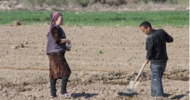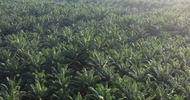Despite opposition from Ethiopia's President and environmental authorities, a rainforest area providing livelihood to an indigenous people has been leased out to make tea plantations.
- afrol News
-
18 February 2011
In recent years sixteen investors, from Israel, Ethiopia and the Netherlands, have opened large-scale farms nearby the village of Hidi, south of Addis Ababa.
- Radio Netherlands
-
18 February 2011
Land grabbing poses no harm on the environment or on the local community, says Saudi billionaire Sheik Mohammed Hussein Al-Amoudi who is seeking to expand his farmland in Ethiopia from 10,000 hectares to 250,000 hectares.
- Afrik News
-
17 February 2011
A top official at UN agencies seeks to allay apprehensions among people of African countries that propose to lease farmland to investors from countries like India.
The suffering of farmers in Ethiopia is going from worse to the worst as a result of inequitable land acquisitions, better called “neo-colonial land grabbing”, by foreign investors.
- Gadaa.com
-
11 February 2011
Ato Tamiru, chairman of the Gumare Kebele in Gambella, western Ethiopia, and people in his kebele have been protesting the leasing of a large tract of land to an Indian company to be used for tea farming even though there is a severe food shortage in the country.
- Ethiopian Review
-
08 February 2011
The leftist World Social Forum yesterday denounced land grabbing in Africa by foreign groups as a form of neo-colonialism in a day devoted to debates on the continent.
- The Peninsula
-
08 February 2011
Foreign investors see Africa as a breadbasket. Done well, investment could help with African hunger but create food security for the rest of the world.
- CSMonitor
-
06 February 2011
Ethiopian President Girma Woldegiorgis and the country’s environmental regulator have both written to the Agriculture Ministry expressing concern over the sale of forestry land to foreign agricultural companies.
- Bloomberg
-
04 February 2011
I don't know why the Africa leaders are so blind that they can't see the threat farmland grabs pose for their national sovereignty.
- Ground Reality
-
04 February 2011
Ethiopia has offered 1.8 million hectares of its farmland to Indian investors that equals nearly 40 percent of the total area of the principal grain-growing state of Punjab.
- Economic Times
-
02 February 2011
'Indian farmers can avail the opportunity of vast farming land set aside by Ethiopia,' says Ethiopian Agriculture Minister.
In a recent letter to the Ministry of Agriculture, Girma urges the Ministry to stop giving land to an Indian company, warning that such a deal would damage Meles Zenawi’s “good reputation” on the campaign against global warming.
- Gadaa.com
-
31 January 2011
"All of a sudden the world is waking up and saying, 'Wow, emerging markets, food security... this asset class is going to really perform in the medium term -- the next 8-20 years,'" says new convert James Howard, manager of the Futuregrowth Agri-Fund
Chadha Agro Plc, one of India’s giant operators in agro business, is set to receive 100,000 ha of Oromian land (an area nearly twice the size of Singapore country) in addition to the 300,000 ha of land given to various other Indian investors recently.
- Jimma Times
-
30 January 2011
The lure of cheap land and the promise of making big money are making local farmers and NRIs invest in African countries like Liberia and Ethiopia, whose economies were wrecked by the civil wars.
Several African leaders have bought lands in Ethiopia to develop agricultural projects or tourism resorts. They are let to bypass a 2007 ban on export of cereals, still in place for other investors.
- afrol News
-
28 January 2011
Africa is up for sale by the acre to the highest bidder. But how can rice exports from Ethiopia to Saudi Arabia be justified?
In this month's Global development podcast, the Guardian looks at land grabs, explores why they are happening, considers their implications and examines what – if anything – can be done to ensure large-scale agricultural investments are used for local development.
Mr. Meles Zenawi, the Prime Minister of Ethiopia, will make scheduled appearances at the World Economic Forum (WEF) in Davos, Switzerland, on Thursday, January 27
- Gadaa.com
-
21 January 2011
As Gulf states continue to invest in foreign farmland, what are the long term implications
- Arabian Business
-
13 January 2011
"We have set up a global food system that supports speculation. And with [such] markets, we can't get speculators out of the food business," said Lester Brown, an agricultural policy expert and founder of the Washington-based Earth Policy Institute.
India's ACIL Cotton Industries said it plans to invest nearly $15 million to start contract farming of crops like coffee, pulses, oilseeds, cereals, potato, sugarcane and vegetables through lease-hold agricultural land in Brazil, Congo and Ethiopia.
- Business Standard
-
06 January 2011
Food prices are soaring again and the highest risks of farmland expropriation remain in Latin America, while the greatest impact of the recent rally could be on land deals in Africa.
In Ethiopia, resentments over land grab have already started claiming lives. The TPLF regime has already killed 10 protesting ethnic Anuak farmers and has sent thousands more to concentration camps.
- Ethiomedia
-
04 January 2011
The seizing of the poor farmers' land is destroying their only hope of survival on earth.
- Modern Ghana
-
27 December 2010
Affected rural poor communities and their allies are not likely to simply accept the land grabbing process in the way the World Bank and its supporters might suppose.
- Capital Ethiopia
-
27 December 2010
Not a single farmer has been dispossessed of his holding on account of foreign investment, blasts Ethiopia's Ministry of Foreign Affairs
- Week Horn Africa
-
24 December 2010
The Diaspora is just airing the voice of the voiceless Ethiopians for those who are on a land bonanza to stop hurting our people. There is a great danger coming. When? No one knows but it is coming.
- Ecadforum
-
24 December 2010
Across Africa and the developing world, a new global land rush is gobbling up large expanses of arable land.
- New York Times
-
21 December 2010















